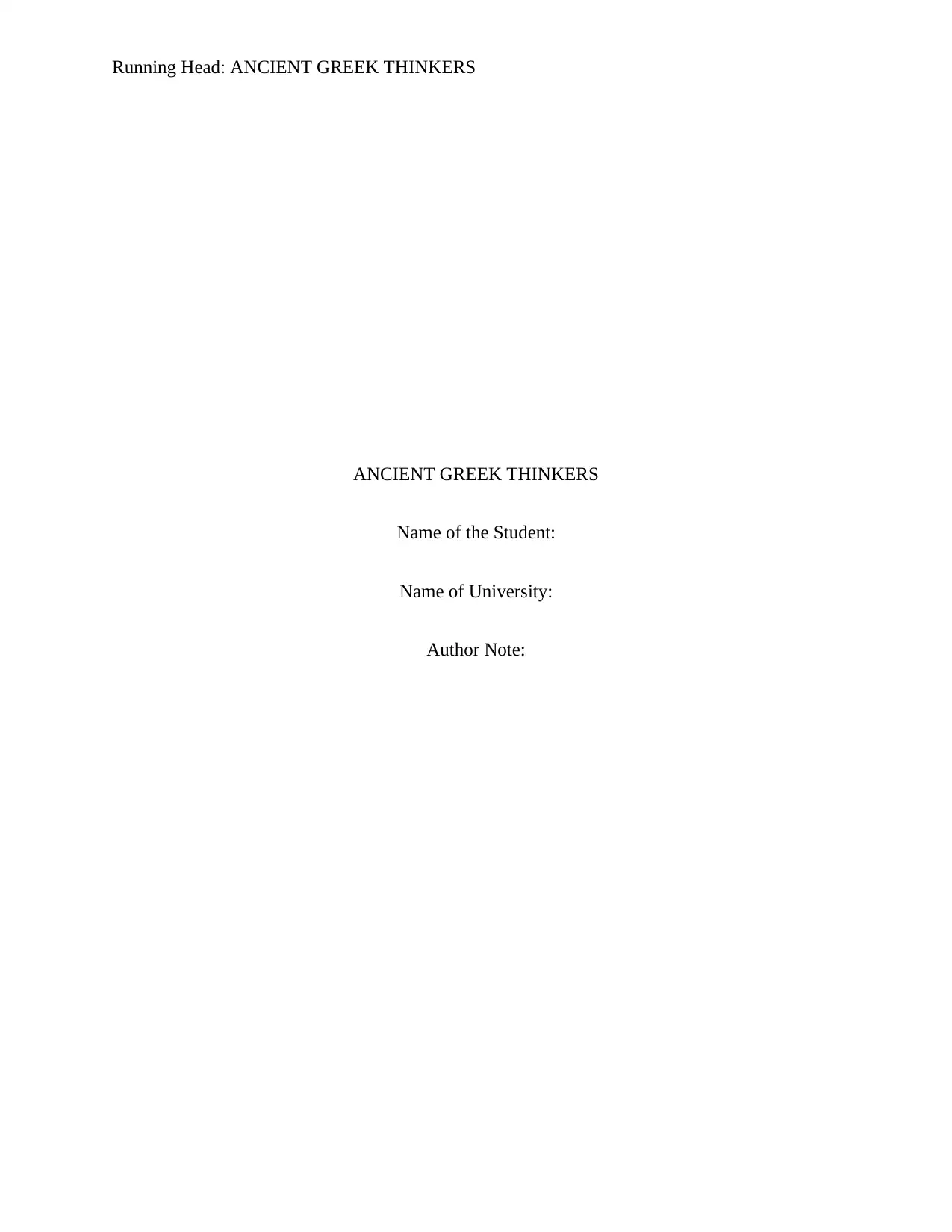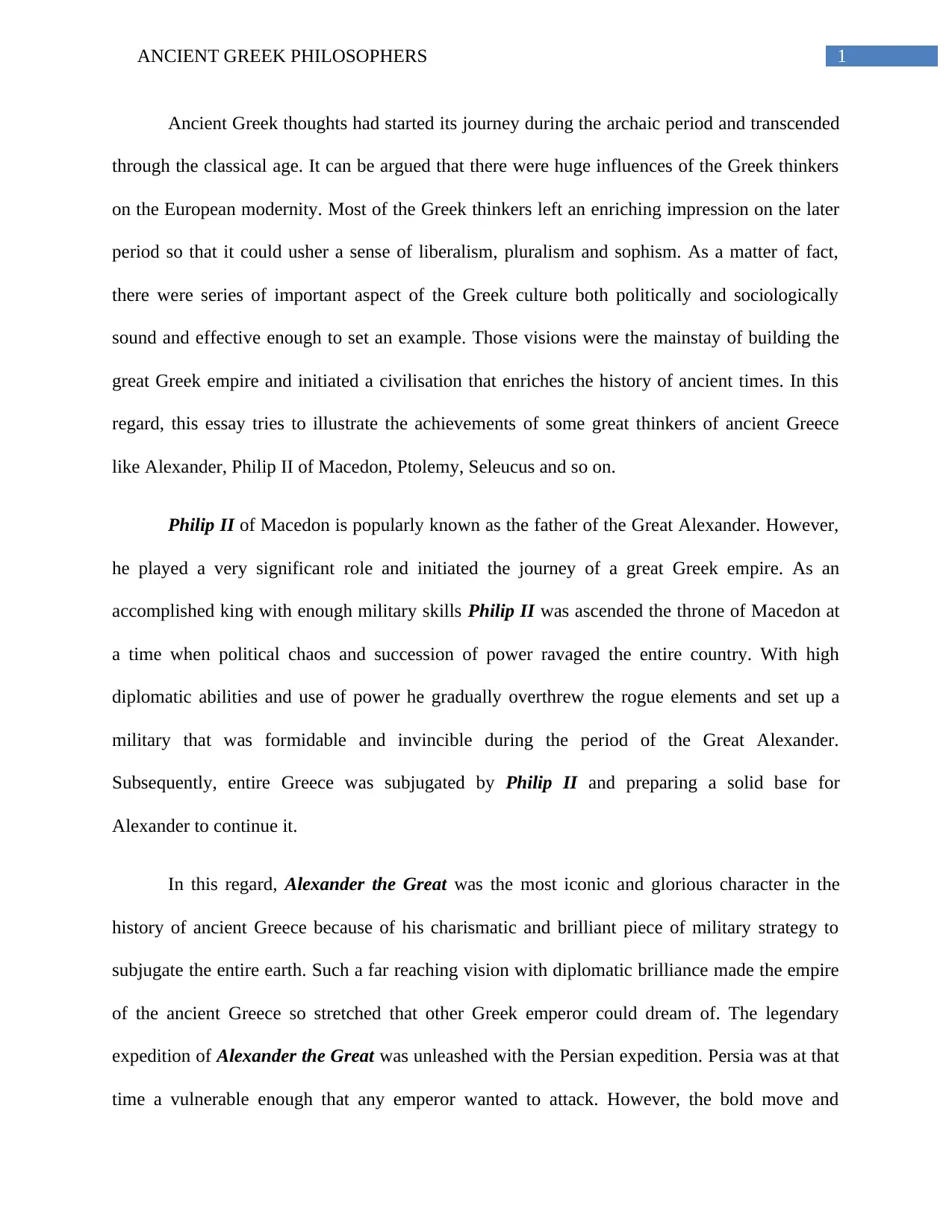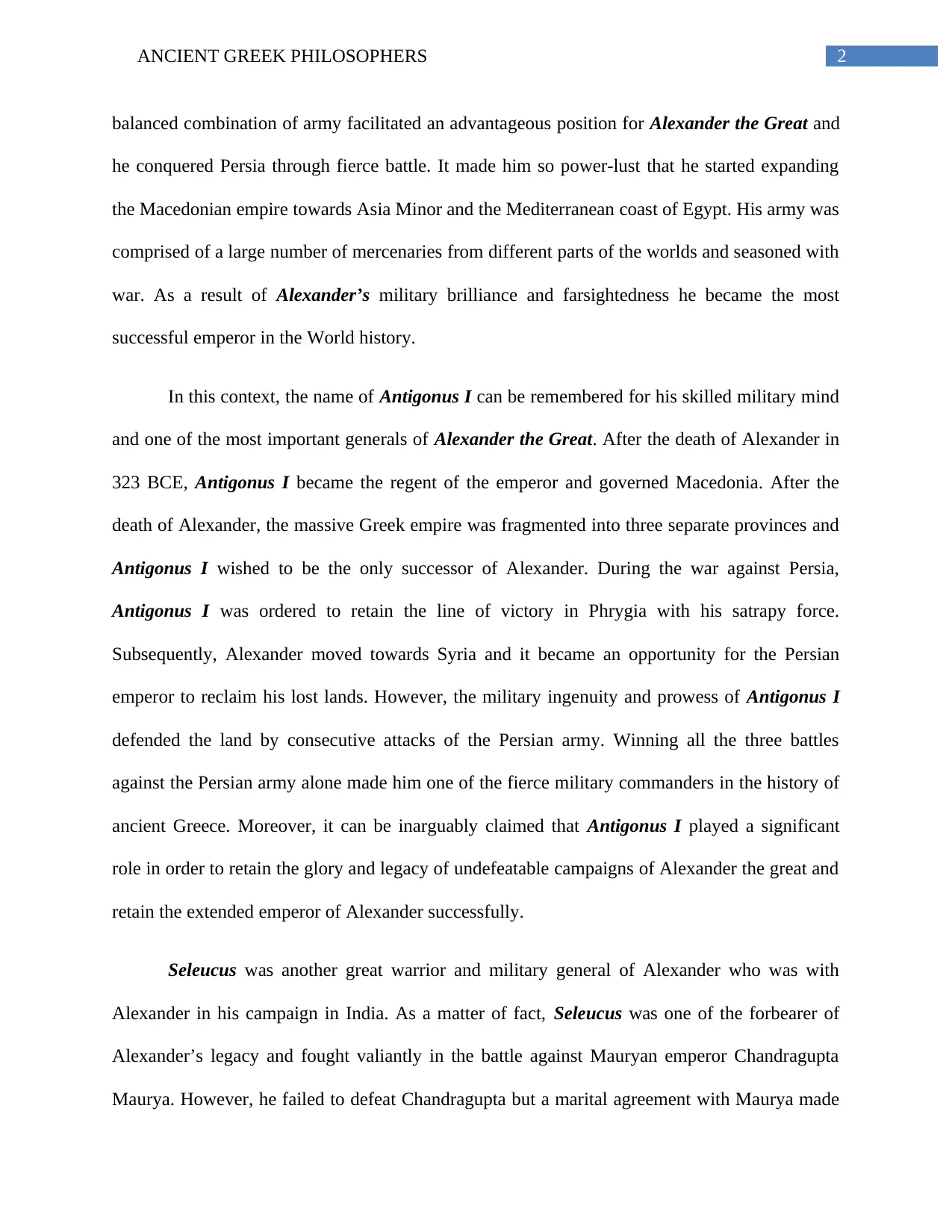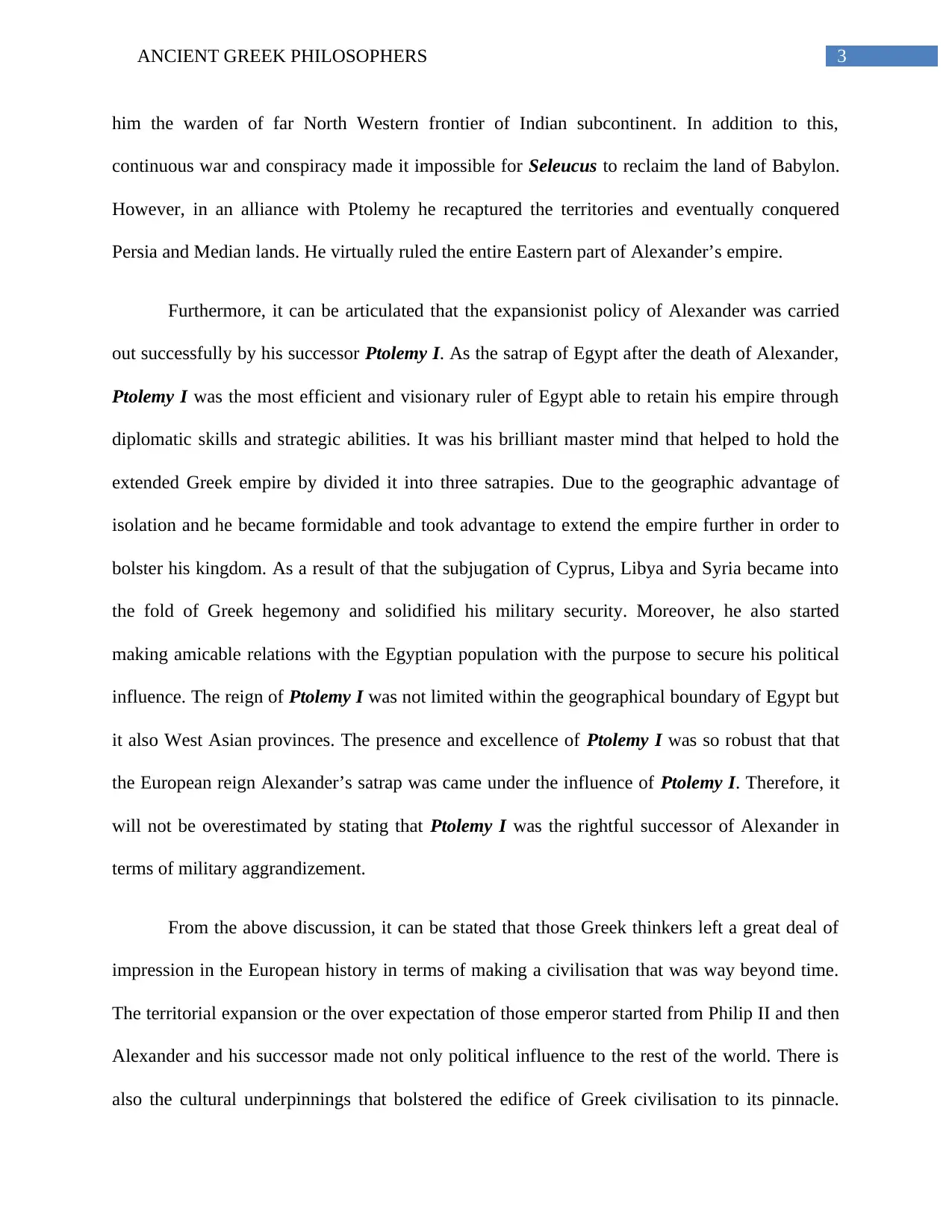Analyzing the Influence and Achievements of Ancient Greek Thinkers
VerifiedAdded on 2023/04/21
|5
|1148
|191
Essay
AI Summary
This essay delves into the accomplishments of prominent ancient Greek figures such as Philip II of Macedon, Alexander the Great, Antigonus I, Seleucus, and Ptolemy I, highlighting their significant roles in shaping the ancient world. It examines Philip II's strategic military reforms and his groundwork for Alexander's conquests, Alexander's unparalleled military campaigns and the vast expansion of the Greek empire, and the contributions of Alexander's successors in maintaining and further extending Greek influence. The essay emphasizes the enduring impact of these thinkers on European history, particularly their contributions to political thought, cultural development, and the establishment of a sophisticated civilization. It concludes that their territorial expansions and cultural contributions cemented the pinnacle of Greek civilization, leaving an indelible mark on the world.

Running Head: ANCIENT GREEK THINKERS
ANCIENT GREEK THINKERS
Name of the Student:
Name of University:
Author Note:
ANCIENT GREEK THINKERS
Name of the Student:
Name of University:
Author Note:
Paraphrase This Document
Need a fresh take? Get an instant paraphrase of this document with our AI Paraphraser

1ANCIENT GREEK PHILOSOPHERS
Ancient Greek thoughts had started its journey during the archaic period and transcended
through the classical age. It can be argued that there were huge influences of the Greek thinkers
on the European modernity. Most of the Greek thinkers left an enriching impression on the later
period so that it could usher a sense of liberalism, pluralism and sophism. As a matter of fact,
there were series of important aspect of the Greek culture both politically and sociologically
sound and effective enough to set an example. Those visions were the mainstay of building the
great Greek empire and initiated a civilisation that enriches the history of ancient times. In this
regard, this essay tries to illustrate the achievements of some great thinkers of ancient Greece
like Alexander, Philip II of Macedon, Ptolemy, Seleucus and so on.
Philip II of Macedon is popularly known as the father of the Great Alexander. However,
he played a very significant role and initiated the journey of a great Greek empire. As an
accomplished king with enough military skills Philip II was ascended the throne of Macedon at
a time when political chaos and succession of power ravaged the entire country. With high
diplomatic abilities and use of power he gradually overthrew the rogue elements and set up a
military that was formidable and invincible during the period of the Great Alexander.
Subsequently, entire Greece was subjugated by Philip II and preparing a solid base for
Alexander to continue it.
In this regard, Alexander the Great was the most iconic and glorious character in the
history of ancient Greece because of his charismatic and brilliant piece of military strategy to
subjugate the entire earth. Such a far reaching vision with diplomatic brilliance made the empire
of the ancient Greece so stretched that other Greek emperor could dream of. The legendary
expedition of Alexander the Great was unleashed with the Persian expedition. Persia was at that
time a vulnerable enough that any emperor wanted to attack. However, the bold move and
Ancient Greek thoughts had started its journey during the archaic period and transcended
through the classical age. It can be argued that there were huge influences of the Greek thinkers
on the European modernity. Most of the Greek thinkers left an enriching impression on the later
period so that it could usher a sense of liberalism, pluralism and sophism. As a matter of fact,
there were series of important aspect of the Greek culture both politically and sociologically
sound and effective enough to set an example. Those visions were the mainstay of building the
great Greek empire and initiated a civilisation that enriches the history of ancient times. In this
regard, this essay tries to illustrate the achievements of some great thinkers of ancient Greece
like Alexander, Philip II of Macedon, Ptolemy, Seleucus and so on.
Philip II of Macedon is popularly known as the father of the Great Alexander. However,
he played a very significant role and initiated the journey of a great Greek empire. As an
accomplished king with enough military skills Philip II was ascended the throne of Macedon at
a time when political chaos and succession of power ravaged the entire country. With high
diplomatic abilities and use of power he gradually overthrew the rogue elements and set up a
military that was formidable and invincible during the period of the Great Alexander.
Subsequently, entire Greece was subjugated by Philip II and preparing a solid base for
Alexander to continue it.
In this regard, Alexander the Great was the most iconic and glorious character in the
history of ancient Greece because of his charismatic and brilliant piece of military strategy to
subjugate the entire earth. Such a far reaching vision with diplomatic brilliance made the empire
of the ancient Greece so stretched that other Greek emperor could dream of. The legendary
expedition of Alexander the Great was unleashed with the Persian expedition. Persia was at that
time a vulnerable enough that any emperor wanted to attack. However, the bold move and

2ANCIENT GREEK PHILOSOPHERS
balanced combination of army facilitated an advantageous position for Alexander the Great and
he conquered Persia through fierce battle. It made him so power-lust that he started expanding
the Macedonian empire towards Asia Minor and the Mediterranean coast of Egypt. His army was
comprised of a large number of mercenaries from different parts of the worlds and seasoned with
war. As a result of Alexander’s military brilliance and farsightedness he became the most
successful emperor in the World history.
In this context, the name of Antigonus I can be remembered for his skilled military mind
and one of the most important generals of Alexander the Great. After the death of Alexander in
323 BCE, Antigonus I became the regent of the emperor and governed Macedonia. After the
death of Alexander, the massive Greek empire was fragmented into three separate provinces and
Antigonus I wished to be the only successor of Alexander. During the war against Persia,
Antigonus I was ordered to retain the line of victory in Phrygia with his satrapy force.
Subsequently, Alexander moved towards Syria and it became an opportunity for the Persian
emperor to reclaim his lost lands. However, the military ingenuity and prowess of Antigonus I
defended the land by consecutive attacks of the Persian army. Winning all the three battles
against the Persian army alone made him one of the fierce military commanders in the history of
ancient Greece. Moreover, it can be inarguably claimed that Antigonus I played a significant
role in order to retain the glory and legacy of undefeatable campaigns of Alexander the great and
retain the extended emperor of Alexander successfully.
Seleucus was another great warrior and military general of Alexander who was with
Alexander in his campaign in India. As a matter of fact, Seleucus was one of the forbearer of
Alexander’s legacy and fought valiantly in the battle against Mauryan emperor Chandragupta
Maurya. However, he failed to defeat Chandragupta but a marital agreement with Maurya made
balanced combination of army facilitated an advantageous position for Alexander the Great and
he conquered Persia through fierce battle. It made him so power-lust that he started expanding
the Macedonian empire towards Asia Minor and the Mediterranean coast of Egypt. His army was
comprised of a large number of mercenaries from different parts of the worlds and seasoned with
war. As a result of Alexander’s military brilliance and farsightedness he became the most
successful emperor in the World history.
In this context, the name of Antigonus I can be remembered for his skilled military mind
and one of the most important generals of Alexander the Great. After the death of Alexander in
323 BCE, Antigonus I became the regent of the emperor and governed Macedonia. After the
death of Alexander, the massive Greek empire was fragmented into three separate provinces and
Antigonus I wished to be the only successor of Alexander. During the war against Persia,
Antigonus I was ordered to retain the line of victory in Phrygia with his satrapy force.
Subsequently, Alexander moved towards Syria and it became an opportunity for the Persian
emperor to reclaim his lost lands. However, the military ingenuity and prowess of Antigonus I
defended the land by consecutive attacks of the Persian army. Winning all the three battles
against the Persian army alone made him one of the fierce military commanders in the history of
ancient Greece. Moreover, it can be inarguably claimed that Antigonus I played a significant
role in order to retain the glory and legacy of undefeatable campaigns of Alexander the great and
retain the extended emperor of Alexander successfully.
Seleucus was another great warrior and military general of Alexander who was with
Alexander in his campaign in India. As a matter of fact, Seleucus was one of the forbearer of
Alexander’s legacy and fought valiantly in the battle against Mauryan emperor Chandragupta
Maurya. However, he failed to defeat Chandragupta but a marital agreement with Maurya made
⊘ This is a preview!⊘
Do you want full access?
Subscribe today to unlock all pages.

Trusted by 1+ million students worldwide

3ANCIENT GREEK PHILOSOPHERS
him the warden of far North Western frontier of Indian subcontinent. In addition to this,
continuous war and conspiracy made it impossible for Seleucus to reclaim the land of Babylon.
However, in an alliance with Ptolemy he recaptured the territories and eventually conquered
Persia and Median lands. He virtually ruled the entire Eastern part of Alexander’s empire.
Furthermore, it can be articulated that the expansionist policy of Alexander was carried
out successfully by his successor Ptolemy I. As the satrap of Egypt after the death of Alexander,
Ptolemy I was the most efficient and visionary ruler of Egypt able to retain his empire through
diplomatic skills and strategic abilities. It was his brilliant master mind that helped to hold the
extended Greek empire by divided it into three satrapies. Due to the geographic advantage of
isolation and he became formidable and took advantage to extend the empire further in order to
bolster his kingdom. As a result of that the subjugation of Cyprus, Libya and Syria became into
the fold of Greek hegemony and solidified his military security. Moreover, he also started
making amicable relations with the Egyptian population with the purpose to secure his political
influence. The reign of Ptolemy I was not limited within the geographical boundary of Egypt but
it also West Asian provinces. The presence and excellence of Ptolemy I was so robust that that
the European reign Alexander’s satrap was came under the influence of Ptolemy I. Therefore, it
will not be overestimated by stating that Ptolemy I was the rightful successor of Alexander in
terms of military aggrandizement.
From the above discussion, it can be stated that those Greek thinkers left a great deal of
impression in the European history in terms of making a civilisation that was way beyond time.
The territorial expansion or the over expectation of those emperor started from Philip II and then
Alexander and his successor made not only political influence to the rest of the world. There is
also the cultural underpinnings that bolstered the edifice of Greek civilisation to its pinnacle.
him the warden of far North Western frontier of Indian subcontinent. In addition to this,
continuous war and conspiracy made it impossible for Seleucus to reclaim the land of Babylon.
However, in an alliance with Ptolemy he recaptured the territories and eventually conquered
Persia and Median lands. He virtually ruled the entire Eastern part of Alexander’s empire.
Furthermore, it can be articulated that the expansionist policy of Alexander was carried
out successfully by his successor Ptolemy I. As the satrap of Egypt after the death of Alexander,
Ptolemy I was the most efficient and visionary ruler of Egypt able to retain his empire through
diplomatic skills and strategic abilities. It was his brilliant master mind that helped to hold the
extended Greek empire by divided it into three satrapies. Due to the geographic advantage of
isolation and he became formidable and took advantage to extend the empire further in order to
bolster his kingdom. As a result of that the subjugation of Cyprus, Libya and Syria became into
the fold of Greek hegemony and solidified his military security. Moreover, he also started
making amicable relations with the Egyptian population with the purpose to secure his political
influence. The reign of Ptolemy I was not limited within the geographical boundary of Egypt but
it also West Asian provinces. The presence and excellence of Ptolemy I was so robust that that
the European reign Alexander’s satrap was came under the influence of Ptolemy I. Therefore, it
will not be overestimated by stating that Ptolemy I was the rightful successor of Alexander in
terms of military aggrandizement.
From the above discussion, it can be stated that those Greek thinkers left a great deal of
impression in the European history in terms of making a civilisation that was way beyond time.
The territorial expansion or the over expectation of those emperor started from Philip II and then
Alexander and his successor made not only political influence to the rest of the world. There is
also the cultural underpinnings that bolstered the edifice of Greek civilisation to its pinnacle.
Paraphrase This Document
Need a fresh take? Get an instant paraphrase of this document with our AI Paraphraser

4ANCIENT GREEK PHILOSOPHERS
Therefore, it can be concluded that the essay rightly illustrates the success of those Greek
thinkers who helped to shape the empire emphatically.
Therefore, it can be concluded that the essay rightly illustrates the success of those Greek
thinkers who helped to shape the empire emphatically.
1 out of 5
Related Documents
Your All-in-One AI-Powered Toolkit for Academic Success.
+13062052269
info@desklib.com
Available 24*7 on WhatsApp / Email
![[object Object]](/_next/static/media/star-bottom.7253800d.svg)
Unlock your academic potential
Copyright © 2020–2026 A2Z Services. All Rights Reserved. Developed and managed by ZUCOL.



